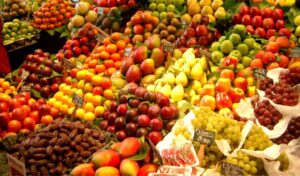Food security, food systems, and food resilience are three related but contested concepts, with unique intellectual and policy histories. A new open access book brings together several contributions by global experts on these issues and highlights their interconnectedness. The book aims to contribute to understanding how food systems can be strengthened to enhance resilience and food security for all. This article highlights key insights from the book, drawing from its 12 chapters and over 20 authors.

Food security is a ‘wicked problem’ that is associated with many paradoxes and difficult policy choices. Paradoxes include the coexistence of high rates of stunting and of obesity in several countries, and persistently high levels of child malnutrition despite well-functioning food systems. Policy choices include whether to keep food prices high for producers or low for consumers, whether to manipulate consumer behaviour to achieve healthier diets (e.g. a sugar tax), and – in the context of climate change (the ‘world’s worst wicked problem’) – whether to focus agricultural investments on maximising yield growth or minimising yield volatility.
Food systems have many actors
Researchers and policy-makers have paid more attention to food producers and consumers than to processors and distributors, and have paid inadequate attention to urban food systems. The Covid-19 pandemic revealed the risks associated with food processing and the precarious access to food of the urban poor, and the urgent need to reverse this relative neglect. Food systems analysis must be disaggregated by component, across territories and across different categories of residents within the same territory.
Contra pessimistic views that the global food system is ‘broken’, capacity to feed the world’s rapidly growing population has never been stronger, and famines have been virtually eradicated from all but conflict zones. This incomplete but significant achievement can be attributed to scientific innovation (in agriculture, transport, information, etc.), as well as deepening institutions (at local, national, and global levels).
Building resilient systems
Resilient food systems require resilient producers, resilient processors, resilient distributors, and resilient consumers. Resilience does not mean preserving the status quo ante, it means constantly adjusting to shifting shocks and stressors, ‘climate-proofing’ and ‘shock-proofing’ every component of the food system, and aligning technological innovation with political commitment. Shocks like Covid-19 stress food systems and compound the vulnerability of households and communities that are chronically food insecure with low baseline resilience. Resilience capacity of food system actors is also gendered, and is driven by intersectional identities as well as individual positions in food value chains.
Although global food systems appear more resilient than ever before, there is no reason for complacency. Progress towards zero hunger remains uneven across countries and territories, between rural and urban areas, and over time. There is a ‘fractured consensus’ on food security and resilience, with some agencies and governments focusing on food production and agricultural growth while others focus on equitable access to food for all. Food systems across the world have demonstrated their capacity to deliver food, but not necessarily healthy, nutritious, and affordable diets.
Accelerating climate change, numerous fragile and conflict-affected contexts, mass displacement and migration could all threaten food access and food security for millions of people, potentially reversing decades of gains. Food system actors need to balance the benefits and risks of integrating into global value chains versus shortened value chains that prioritise local food producers and food sovereignty, but are less diversified and possibly less resilient against unpredictable future shocks. Governments need to navigate these challenges and trade-offs, to make policy choices that build resilient food systems and enhanced food security for all.

